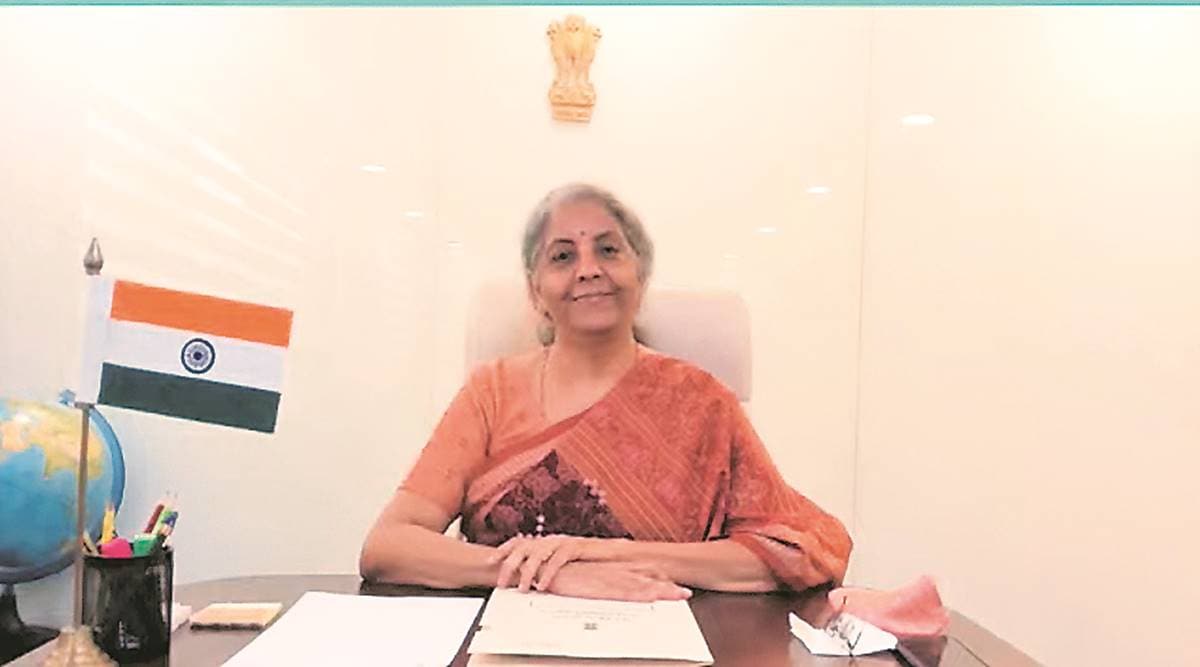 Union Finance Minister Nirmala Sitharaman was in conversation with
P Vaidyanathan Iyer, Executive Editor (National Affairs), The Indian Express,
and Joseph Leahy, Asia News Editor, Financial Times
Union Finance Minister Nirmala Sitharaman was in conversation with
P Vaidyanathan Iyer, Executive Editor (National Affairs), The Indian Express,
and Joseph Leahy, Asia News Editor, Financial Times On the Indian economy losing momentum
Prior to the pandemic, between June 2019 and till the budget was presented in February 2021, there was certainly a slowdown, a shortage of liquidity, and therefore, when people needed money, they couldn’t get it; we undertook a lot of measures to ensure that liquidity reaches people. In fact, much before the festive season in India, between September and October, we had ensured that banks, NBFCs and others reached out with liquidity. So that year we did have a specific problem of banks not being able to extend credit, which was sorted out and in early 2021, we saw clear signs of recovery. With that, we presented a budget in February 2021. But, of course, within weeks after presenting the budget, there was Covid-19.
While the second wave is challenging us on several grounds — supply of critical medicines, supply of required quantities of oxygen — the government has been rapidly taking a lot of measures, inclusive of where necessary to import medical quality oxygen. As regards critical medicines, we have taken many steps to make sure that the issues related to supply are addressed. I’m very happy that the Prime Minister had mentioned it in so many words that there shall not be a countrywide lockdown comparable to the one which we had in 2020. The reason for that is in 2020, we did not have adequate PPE kits, and we ramped up the production of PPEs and ventilators, and testing labs have been set up all over the country. The situation today is very different. We have two vaccines already. So we don’t think there is a need for across-the-board lockdown.
On staying the course on reforms
My day starts with a meeting with the secretaries of my ministry and the secretaries of Corporate Affairs, which is also something I look after. The way we have planned for disinvestment, setting up the DFI (Development Finance Institution), looking at asset-reconstruction companies, everything is on course. In fact, the message from the secretaries is that we are going as smoothly as before. Therefore, we don’t suspect that will be affected.
On foreign investment
I have spent quite some time looking at the recent tariff issues. The items on which the hikes have happened are very consistent with what we have laid before ourselves in the name of Atmanirbhar Bharat. If they are end-consumer products which we manufacture in this country, we would rather have our capacities strengthened. But we have not raised any tariffs on inputs of raw materials or intermediary goods. So we don’t intend at being regressive. Secondly, on the issue of (disputes with) Vodafone and Cairn, I’ve recently had a meeting with a representative of Cairn, and we are talking. The Prime Minister clearly said we don’t believe in retrospective taxation. However, the international arbitrations questioning India’s sovereign right to tax is a matter of concern, and to that limited extent, we are worried that it sets a wrong precedent.
On self-reliance vs global integration
If you tell me that they could be contradictory, maybe to an extent they are. Indian manufacturing has been hurt on many grounds, particularly on matters which have bulk usage in this country, not those specified things which we don’t have the wherewithal to produce, like high-end technology, but even basic goods. We’ve been flooded by unjustified dumping. As a result, many of our small and medium manufacturing units are not able to survive and the Indian economy depends largely on our MSMEs.
As a government, we have taken a call that MSMEs need some support, particularly if they are producing consumer items. When we say atmanirbhar, we’re not shutting the Indian economy, we are saying that we have to play on our strengths.
- The Indian Express website has been rated GREEN for its credibility and trustworthiness by Newsguard, a global service that rates news sources for their journalistic standards.


